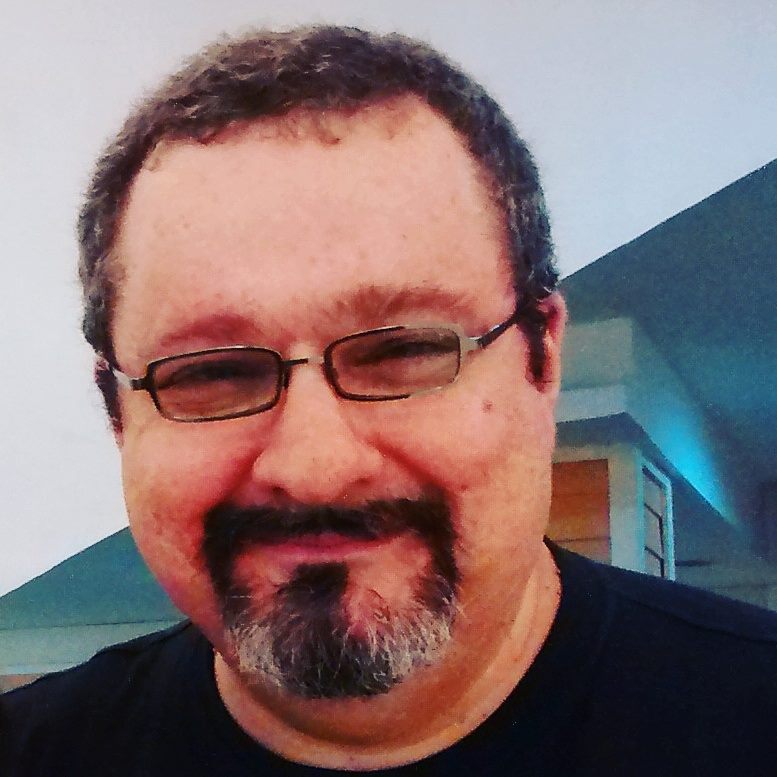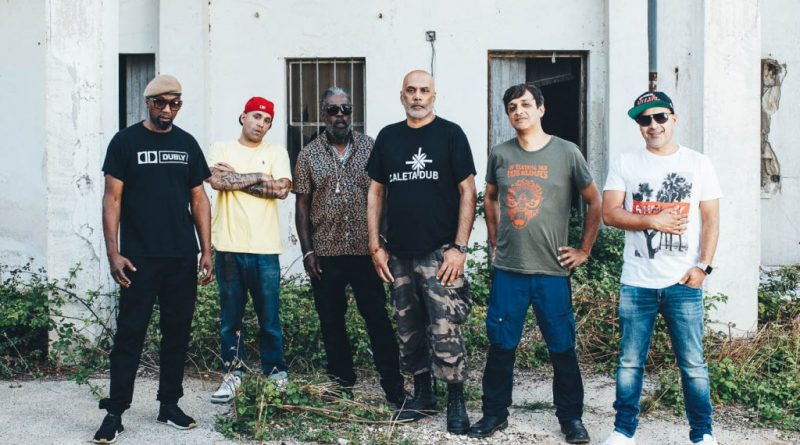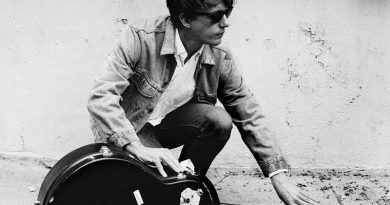Entrevista: Asian Dub Foundation
Para um site de cultura pop totalmente independente como é o caso da Célula Pop, entrar em contato com artistas estrangeiros, sem a ajuda de assessoria de imprensa aqui no Brasil e agendar/executar uma entrevista é algo hercúleo. Porém, de vez em quando, a mágica acontece. Se você nos lê há tempos, já viu que batemos papo com Laetitia Sadier, vocalista do Stereolab e com Tjinder Singh, guitarrista e vocalista do Cornershop. Em ambos os casos, na cara dura perguntamos sobre o interesse deles em falar com a gente e eles toparam, sendo absolutamente adoráveis e simpáticos.
For a totally independent pop culture website such as Célula Pop, getting in touch with foreign artists, without the help of a press officer here in Brazil and scheduling / executing an interview is something herculean. However, from time to time, magic happens. If you’ve read us for a long time, you’ve already seen that we chat with Laetitia Sadier, singer of Stereolab and with Tjinder Singh, guitarist and singer of Cornershop. In both cases, we asked about their interest in talking to us and they agreed, being absolutely adorable and friendly.
Agora é a vez de Steve “Chandrasonic” Savale, mente brilhante e pensante por trás do Asian Dub Foundation, banda britânica que lançou o ótimo álbum “Access Denied” há poucos dias, cuja resenha você também lê aqui. Steve Savale inseriu o nome “Chandra” e, mais adiante, “Chandrasonic”, que ele traz até hoje, para marcar sua ascendência e, além das guitarras da banda, ele é um dos mais importantes ativistas da Inglaterra, usando a música do grupo para transmitir posicionamentos importantes, especialmente nos dias atuais.
Now it is the turn of Steve “Chandrasonic” Savale, brilliant and the mastermind behind the Asian Dub Foundation, a British band that released the great album “Access Denied” a few days ago, whose review you can also read here. Steve Savale inserted the name “Chandra” and later “Chandrasonic”, which he brings to this day, to mark his ancestry and, in addition to the guitars of the band, he is one of the most important activists in England, using the group’s music to convey important placements, especially these days.
Entrevistas assim são feitas por e-mail, logo, às vezes elas saem econômicas, mas, por outro lado, são reveladoras e mostram que tipo de artista está interessado em conversar sobre seu trabalho de uma forma realmente global. E a gente segue insistindo e convidando essa galera para falar para nossos leitores. Sendo assim, aqui vai a nossa conversa com Steve, rápida, porém, bacana e reveladora da necessidade de mudarmos nossa maneira de lidar com o próximo e com o planeta.
Interviews like this are done by e-mail, so sometimes they are economical, but on the other hand, they are revealing and show what kind of artist is interested in talking about his work in a really global way. And we keep insisting and inviting these people to speak to our readers. So, here is our conversation with Steve, quick, but cool and revealing the need to change our way of dealing with others and the planet.
Ao fim do texto, está a versão em inglês, para que fãs de outros idiomas possam ver o bate-papo.
At the end of the text, there is the English version, so that fans of other languages can see the chat.
PORTUGUESE VERSION
– “Access Denied” traz, já no título, a questão da migração e da aceitação de imigrantes em países como o Reino Unido do Brexit. Mas o tema mais central do álbum me pareceu a questão do futuro que está sendo roubado de nós. Como você vê isso?
ADF: No fim das contas, acho que todos os problemas se resumem a um; desigualdade.
– E a questão do clima? Como pensar no futuro sem mudar a forma como tratamos o meio ambiente?
ADF: É impossível pensar no futuro sem mudar a forma como tratamos o meio ambiente. Infelizmente, existem muitas pessoas que investem neste status quo, portanto, optam por não pensar.
– Como foi o contato com Greta Thunberg para falar sobre o uso de sua fala e como surgiu a ideia de fazer sua música de fala?
ADF: Não houve contato direto, o discurso é livre. Fiquei impressionado com as acusações diretas e intransigentes de Greta sobre a ignorância das gerações anteriores.
– Como os artistas convidados foram vieram a participar do álbum? Como foi, por exemplo, a aproximação com a rapper chilena Ana Tijoux?
ADF: Isso veio através de Simone Manchisi, nossa agente que trabalha com Ana e Dub FX. Um cara visionário!
– Duas das músicas mais legais do disco – “Swarm” e “Smash And Grab The Future” são bem distintas – a primeira tem mais sons da África do Norte e a segunda é um hip hop d’n’b. Como você faz a pesquisa de som para os álbuns?
ADF: É bastante espontâneo, na verdade, jogamos tinta na parede e procuramos os melhores padrões. A flauta e a guitarra em “Swarm” definitivamente estavam indo para uma vibe não exatamente árabe, mas para a música de países do Norte da África, como Mali e Argélia.
– Ouvindo o álbum encontramos algumas semelhanças entre “Exodus”, de Bob Marley e “Clandestino”, de Manu Chao, que são obras sobre ir e vir no mundo e como essas viagens mudam a cultura de um povo. Você percebe essas interseções temáticas?
ADF: Bem, “Swarm” definitivamente evocou a vibração de longa marcha de “Exodus” para mim, embora tenha uma fórmula de compasso diferente. Não tanto “Clandestino”, embora seja um ótimo álbum, claro.
– Você conhece um disco chamado “Selvagem?” de uma banda brasileira chamada Paralamas do Sucesso? Há muita visão da música afro-caribenha e brasileira nesse trabalho, feito em 1986. Como você vê a música do ADF em meio aos sons da diáspora negra?
ADF: Não conheço esse álbum. Nós realmente não “vemos” a música do ADF, deixamos que os outros “vejam”.
– Que outras bandas e artistas semelhantes ao ADF você recomendaria? Existe um cenário de bandas e artistas progressistas organizados em Londres ou mesmo na Grã-Bretanha?
ADF: Eu não acho que existam outras bandas semelhantes ao ADF, embora eu definitivamente recomendaria 47 Soul e Mourning a Black Star. Não tenho certeza se uma organização de bandas progressivas é necessária. Somos bastante autônomos.
– Olhando para a discografia do ADF, a partir de “Facts and Fictions”, como você analisa o papel que “Acesso negado” tem? E como o Brexit, outra questão central do registro, afeta o país?
ADF: Acreditamos que o Brexit é um projeto de direita desenvolvido por uma elite financeira que fará muito dinheiro às custas de todos os outros. Para os músicos é um desastre, aumentando enormemente o custo das turnês. É a pura exploração do sentimento nacionalista mal informado que trará grande dano aos que foram enganados. Eu não analiso o papel dos nossos álbuns, isso é para outros fazerem. Nós apenas os gravamos.
– Aqui no Brasil, além de todos os crimes que o atual governo comete, temos quase 150.000 mortos pela Covid-19. Como a pandemia afetou a banda?
ADF: Estamos no mesmo barco que todos os outros, embora nos consideremos sortudos, pois ainda estamos todos saudáveis, mas as maiores turnês que faríamos em muitos anos foram canceladas, o que é claro, uma má notícia para nós.
– Se você pudesse escolher um artista muito querido para colaborar com você, quem seria? Alguém com quem você ainda não colaborou.
ADF: Adoraria ouvir os vocalistas do Mourning a Black Star em uma de nossas faixas.
– Steve, como cidadão britânico e mundial, diga-nos: como vamos sair deste triste período da história?
ADF: Não tenho soluções, a não ser continuar pressionando, não importa o que seja jogado contra nós. É tudo o que podemos fazer.
Nota do editor: ao enviar para Steve o link desta entrevista, coloquei em anexo os links para ouvir as canções de “Selvagem?”. Vamos ver o que ele acha.
ENGLISH VERSION
– “Access Denied” has, already in the title, the issue of migration and the acceptance of immigrants in countries like the United Kingdom of Brexit. But the most central theme of the album seemed to me the question of the future that is being stolen from us. How do you see it?
ADF: In the end I guess all the issues come down to one; inequality.
– What about the climate? How to think about the future without changing the way we treat the environment?
ADF: It is impossible to think about the future without changing the way we treat the environment.Unfortunately there are too many people who are invested in the status quo so therefore they choose not to think.
– How was the contact with Greta Thunberg to talk about the use of her speech and how did the idea of making your speech music come up?
ADF: There was no direct contact, the speech is free to be used.I was impressed with Greta’s direct and uncompromising accusations concerning the ignorance of previous generations.
– How were the invited artists invited to participate in the album? How was, for example, the approchement with Ana Tijoux?
ADF: That came through Simone Manchisi, our agent who works with Ana and Dub FX. A visionary guy!
– Two of the coolest songs on the disc – “Swarm” and “Smash And Grab The Future” are very distinct – the first has more north african sounds and the second is a hip hop d’n’b. How do you do the sound research for the albums?
ADF: It’s quite spontaneous really, we throw paint at the wall and look for the best patterns.The flute and guitar on “Swarm” was definitely going for a North African vibe , Mali and Algeria!
– Listening to the album we found some similarities between “Exodus”, by Bob Marley and “Clandestino”, by Manu Chao, which are works about coming and going in the world and how these trips change the culture of a people. Do you notice these thematic intersections?
ADF: Well “Swarm” definitely evoked the long march vibe of “Exodus” for me though it’s in a different time signature. Not so much “Clandestino ” though it’s a great album of course.
– Do you know a record called “Selvagem?” of a Brazilian band called Paralamas do Sucesso? There is a lot of vision of Afro-Caribbean and Brazilian music in this work, done in 1986. How do you see the music of the ADF amid the sounds of the black diaspora?
ADF: I’m not aware of this album.We don’t really “see” the music of ADF we let others do the “seeing”.
– What other bands and artists similar to ADF would you recommend? Is there a scene of progressive bands and artists organized in London or even in Britain?
ADF: I don’t think there are any other bands similar to ADF though I would definitely recommend 47 Soul and Mourning a Black Star. I’m not sure an organisation of progressive bands is necessary. We’re pretty autonomous.
– Looking at the ADF discography, from “Facts And Fictions”, how do you analyze the role that “Access Denied” has? And how does Brexit, another central issue on the record, affect the country?
ADF: We believe Brexit is a right-wing project by a financial elite that will make a lot of money at the expense of everyone else. For musicians it is a disaster, massively increasing the cost of touring. It is pure exploitation of misinformed nationalist sentiment that will inflict great self-harm on those who have been misled. I don’t analyze the role of our albums, that’s for others to do. We just make them.
– Here in Brazil, in addition to all the crimes that the current government commits, we have almost 150.000 killed by Covid-19. How did the pandemic affect the band?
ADF: We’re in the same boat as everyone else, though we count ourselves lucky as we are all still healthy but the biggest tours we’ve had for years have all been cancelled, which is of course bad news for us.
– If you could choose a very dear artist to collaborate with you, who would it be? Someone you haven’t collaborated with yet.
ADF: Would love to hear the vocalists from Mourning a Black Star on one of our tracks.
– Steve, as a British and world citizen, tell us: how are we going to get out of this sad period in history?
ADF: I have no solutions, other than to keep pushing on no matter what is thrown against us. It’s all we can do.
Note: by sending to Steve this interview’s link, I’ve sent to him also the links to hear the songs of “Selvagem?”. Let’s see what he thinks.

Carlos Eduardo Lima (CEL) é doutorando em História Social, jornalista especializado em cultura pop e editor-chefe da Célula Pop. Como crítico musical há mais de 20 anos, já trabalhou para o site Monkeybuzz e as revistas Rolling Stone Brasil e Rock Press. Acha que o mundo acabou no início dos anos 90, mas agora sabe que poucos e bons notaram. Ainda acredita que cacetadas da vida são essenciais para a produção da arte.




